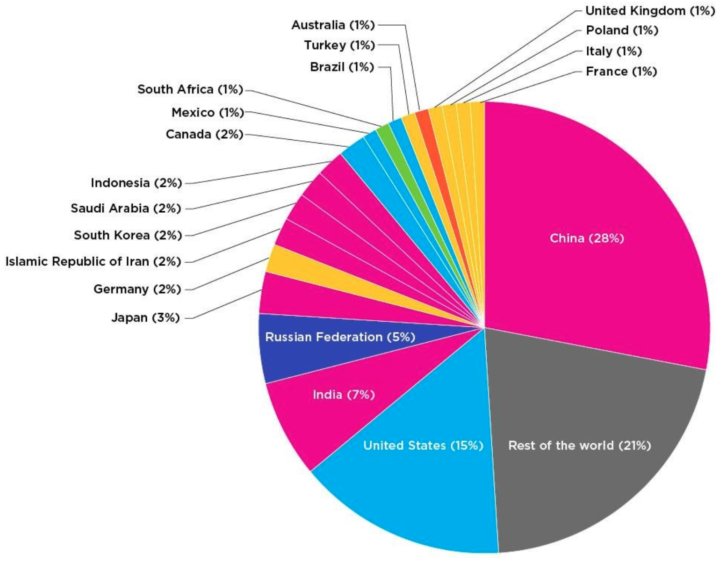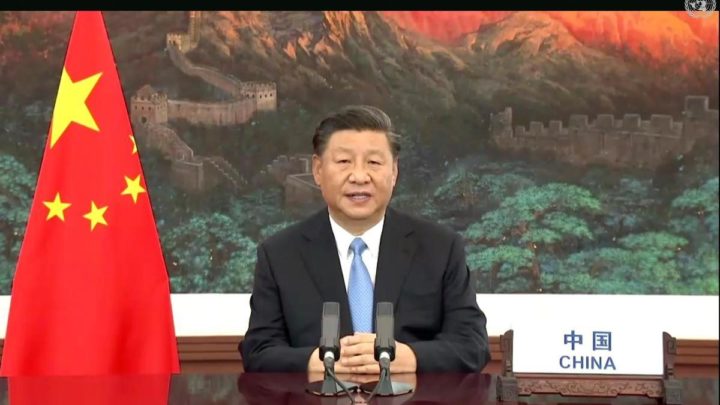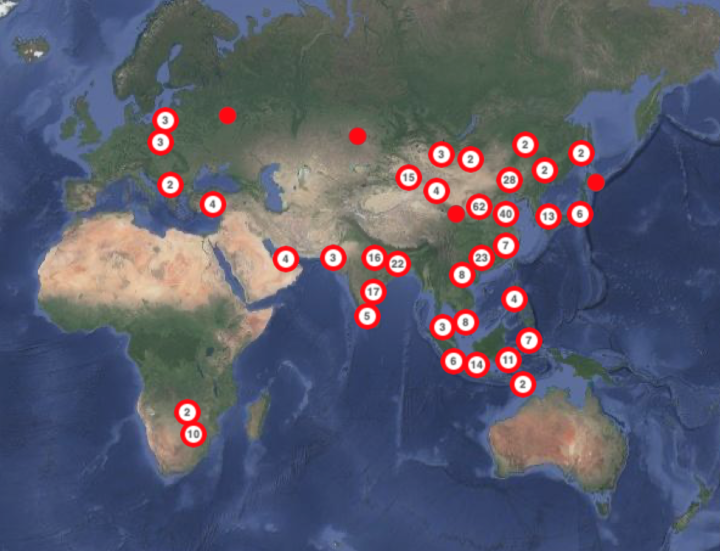China's net zero pledge sends ripples around the world
Xi uses UN speech to pledge world's biggest emitter will get to carbon neutrality by 2060

By Richard Black
@_richardblackShare
Last updated:
‘The most important announcement on global climate policy in years’ was a phrase much in circulation after Chinese President Xi Jinping’s speech to the United Nations General Assembly this week. I would concur: and here’s why.
President Xi told his fellow world leaders that China, the world’s biggest emitter of greenhouse gases, '...aims to have CO2 emissions peak before 2030 and achieve carbon neutrality before 2060'.
There are three main reasons why it matters: the direct impact on global emissions, its effect on diplomacy around climate change, and the consequences for markets and investment.
Emissions

China produces a quarter of the world’s total carbon dioxide emissions.
So clearly there’s no hope of delivering the net zero emissions global economy around mid-century – the path that gives humanity an evens chance of staying under the 1.5ºC ‘danger level’ for global warming – unless China comes to the party.
But until now, China hadn’t put forward any long-term target, let alone one that takes it towards national net zero. Now it has.
President Xi also hinted at an acceleration in shorter-term action.
Previously China had pledged to peak emissions 'around' 2030 – the UNGA speech said 'before 2030'.
Quite what the difference is we don’t know, especially as most analyses indicate China’s emissions will peak well before 2030 anyway; but there we are.
Is its pledge compatible with the Paris Agreement, making the goal of limiting global warming to 1.5ºC more likely to be delivered? It’s on the cusp. 2060 is a little late, especially as China’s per-capita income is hardly the world’s lowest. On the other hand, China has a habit of under-promising and over-achieving.
A bigger problem with Paris Agreement-compatibility lies in President Xi’s silence on other greenhouse gases. Even if China emitted no CO2 at all, its emissions of those other gases, such as methane, would place it in the top five nations currently warming the planet.
Nevertheless… the direct impact of China delivering its CO2 pledge would be big, reducing the eventual extent of global warming by 0.2-0.3ºC. If that doesn’t sound like a lot – well, Niklas Höhne of Climate Action Tracker, which has been analysing countries’ carbon-cutting plans for a decade, says it’s the biggest impact from any single policy announcement since the Paris summit of 2015.
Geopolitics of climate change
The Paris Agreement happened largely because under Barack Obama, the US and China made common cause on climate change.

The US is a long way from that now. So, heading towards COP26, the next UN climate summit in Glasgow next year, the summit that is supposed to galvanise a new international push toward lowering emissions – what is the new big global alliance to be?
Until the US presidential election, an alliance between China and the European Union seems to be the only game in town.
In fact the EU’s leadership can claim some credit for this week’s news, after President of the European Commission Ursula von der Leyen and others urged Xi earlier this month to make exactly this announcement.
The relationship makes sense for China now in several ways. It’s under the cosh from EU leaders over Hong Kong and other issues, Covid19 is affecting both its economy and its reputation, and the EU is making fairly serious noises about imposing border carbon taxes after the bloc puts its own net zero target in place, which may well happen in December; taxes that with a net zero target in place, China would presumably avoid.
A Joe Biden victory could of course rebuild some of the Obama-era relationship with China, on climate change if on little else. And that would be even better from a climate diplomacy point of view, yielding potentially the world’s biggest three emitters (if you count the EU as one entity) all heading towards net zero around mid-century, covering nearly half of global emissions.
Meanwhile it's interesting as a side-note that the UK govt's decision to leave the EU gives it, the host of next year's COP26, no discernible place at this particular adults’ table.
Investment
The third way in which President Xi’s announcement matters is money.
China is the world's biggest... well, everything, really: biggest burner of coal, biggest market for fuels, biggest builder of renewables, biggest global investor in both fossil and clean energy.

Which makes it a market mover like no other.
Translated into action, this net zero commitment would mean China reducing coal, oil and gas use faster than expected, building renewables, electric cars and perhaps nuclear reactors faster, switching international investments from coal to clean faster, going big on negative emissions tech earlier…
...all of which would pretty clearly shift the goalposts for stacks and stacks of companies and investors around the world.
Clean energy investments would become the default even faster than they already are. Producers such as electric cars would become cheaper quicker because of the higher volumes involved. And so on.
Countries not yet committed to net zero would be likely to join the club sooner rather than later, drawn by the growing economic advantages (China will gain economically from implementing net zero, according to the first post-announcement analysis) and perhaps persuaded by geopolitics.
Coming full circle, what this means is that the impact on global warming is likely to be significantly greater than the 0.2-0.3ºC figure quoted earlier.
So what next?
Although the reception for Tuesday’s pledge has been big on enthusiasm, there are many outstanding questions and caveats.
The non-CO2 question is one. A bigger one is: so what’s the plan?
A target without a plan is like an ice-cream without a cone; you can dine out on it for a little while but pretty soon it’s all going to melt away.
The obvious next move is for China to present the pledge formally to other nations via the UN climate convention. President Xi said the nation will be submitting an enhanced Nationally Determined Contribution (NDC) before COP26 – so, using that to fill in some of the gaps in our understanding in that document, to set out elements of the plan, would be good.
Another obvious move would be to embed low-carbon development deep in the next Five-Year Plan covering 2021-25. A particular component of that could be an end to building coal-fired power stations: the country doesn’t need any more, usage rates are going down even as more of them come online, and no single measure could do more to curb both emissions and doubts.
So, lots to come but... seriously, this is big. Mark the day, the week, the year. Even without those missing details, President Xi’s speech has sent ripples right around the world, and we’ll be feeling them for a very long time to come.
Share